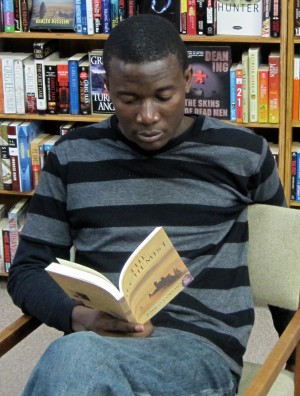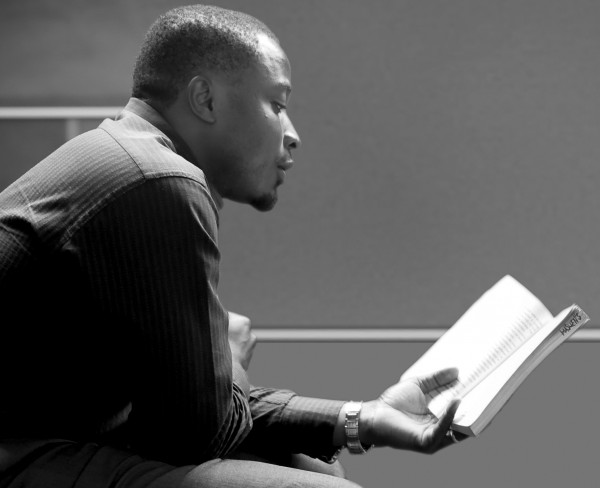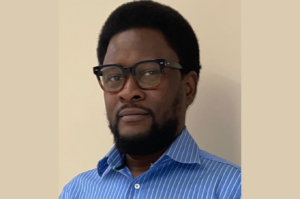Eghosa Imasuen is the C.O.O at Farafina-Kachifo, one of Africa’s top publishing houses. He is the author of To Saint Patrick
and Fine Boys. He is also a medical doctor.
Last year, Farafina published the memoirs of former president Olusegun Obasanjo. The book was subsequently banned and only recently released.
In this interview, I talk to Imasuen about the controversies surrounding the publication of the memoirs, the Nigerian publishing process/industry in general, and his own career as a writer and editor.
Enjoy!
*************
Nice to talk to you. Your publishing house, Farafina, is behind the publishing of former President Obasanjo’s new autobiography My Watch . How did you get involved in this project?
. How did you get involved in this project?
We were approached by aides of President Obasanjo in May of 2014. It was initially very cloak and dagger as we were not told who the author was, only that someone high-profile had just completed his memoirs and was looking for a publisher to offer publishing services. We put in a competitive bid and won the deal. And then we met the author.
Something I’ve always wondered about memoirs written by current and past politicians is how much of it is their words and how much is ghost-written. Anything you can tell us about this one?
President Obasanjo wrote the book himself. I went in with the same wonder you mentioned, but he wrote it. He has a certain idiosyncrasy with his writing; a bit verbose, fond of commas and repeated adjectives. A ghost-writer would have given something away in the text. And during the editing process, we dealt directly with him. The book was so large that only he and I had full knowledge of the text. The editors who worked under me only read their parts. None of his aides knew the full only text, only he and I. He wrote it himself.
As a follow-up to that, I’ve also wondered about President Obasanjo’s work. This is a massive set of three volumes. That must have taken a while to put together, right?
From what I understand, the writing took 18 months. Now the size of the book is a little bit misleading. The author did not want the book’s references footnoted. He knew that that would take time, and he wanted the book out before the end of the year. So he decided that any text referenced would be quoted, at times extensively. So what you see as a very large book is a moderately large one, with lots of excerpts from either his earlier work, or from policy documents.
Publishing is perilous, but also sometimes rewarding. Since moving from full-time writing to full-time publishing, what has been your experience, positive and negative?
Yes. It is perilous. I only had a view of this, barely, because I was a backseat driver, one of those authors who always chided the publisher for not enough publicity, do more, do more. But now that I have taken the wheel, at the firm that published my first two novels, no less, I see things a bit more clearly. It is a difficult business. Both for the pocket and soul. The pirates dictate how you price your books. You are in competition with yourself. Cost of finance in high in Nigeria. There are issues with power and noisy generators that affect productivity in the editorial department. Then there is what reading reams and reams of bad submissions does to someone. It is killing; bad writing kills me.
There are happy moments. When you hold a finished book in your hand, the design, editing, and printing process coming together in one happy accident. But these fleeting moments quickly become overshadowed by the prospect of hitting the market and the fight to have the book earn back what was invested in it.
Feel free to address this particular episode that once pit you against the Nigerian government, last year, over import duties. Many people didn’t follow the fine prints of the matter.
Pit me against the Nigerian government? Kola, you want to put me in trouble. It was the Nigerian publishing industry that was put in trouble by the government. We had a shipment of books that was supposed to arrive in Lagos in March of 2014. When we began processing our clearing documents, we were surprised to see a memo, with its effects dated back to January 1st 2014, list a single tariff line in the Books and Paper section of the ECOWAS CET (Common External Tariff) as being subject to 20% in import duty and 30% in a punitive levy. This tariff line was for School and Scientific Printed Books. Other segments were as before. We would come to understand that the Nigerian Printers lobby in the Manufacturers’ Association of Nigeria had lobbied the Ministry of Finance to increase the tariff in school books to force educational publishers, who receive massive supply contracts from the Universal Basic Education Board (UBEC), to printers domiciled in Nigeria.
It was a very poorly thought-out strategy, something I believe the Minister of Finance did not even see when she signed the 197-item CET. I pointed this out at a meeting that was held in Abuja after the uproar. I told the gathering of publishers, printers and Ministry staff that it would have made a lot more sense to lobby UBEC to insert in its terms a caveat that a certain fraction of books supplied to them must be proven to have been printed in Nigeria; that seeing how messy our ports were, customs officials were calling every book scientific or educational, and harassing even discretionary-reading publishers. What was even worse was that Nigeria was signatory to the UNESCO Florence Agreement that prohibited tariffs on books and other cultural materiel.
What we really faced was a shame-faced government reluctant to admit that they had made a mistake. So we got a moratorium placed on the new tariff regime, which was eventually overturned in January of 2015 when the tariff line was returned back to zero.
It was a messy time; it made the year difficult for publishers. It was quite difficult swaying public opinion our way; what Nigerians saw was publishers who would not support the indigenous printing industry. That was not the case; there is no printing industry. And in the increasingly globalized world, printing is now cheaply done in South-east Asia. This is where we print, as do the Americans and most of Europe. You cannot place a tariff on the free flow of information which is what the Ministry of Finance in effect did. What about medical and engineering texts, would these also require 50% tariffs to come into the country? Do we not have a knowledge gap that we struggle to fill? What was even more glaring was the fact that the big publishers that were targeted by this tariff would have survived the first year, and over the next, they would have transferred their costs to UBEC with inflated contracts and still printed abroad. How the printers thought that this would increase their capacity is beyond me.
How will you say that the Nigerian publishing industry has improved over the last decade, or what more can be done. Also, where do you see it in coming years, and what needs to be done to get it there?
Skills that were lost during the 80s are slowly being regained. There are several new houses now developing the institutional memory needed for survival of the publishing industry in the long term. But it is a system of high attrition. Many of us, the new house, will die, and lessons will be learnt from our demise. The issues are daunting. One major one is piracy, where by just having one successful title, you receive the most painful kind of praise: your book gets pirated.
I think for continued growth in this industry, we need to have piracy punished; it needs to be painful to print and smuggle in counterfeit books.
We were on a panel together at the Ake Festival in November of 2014, but the Q&A didn’t take place because of the Obasanjo panel which you had to be on. How do you address the charge, concerning publishing in indigenous languages, that publishers should not wait for the market to evolve, but be the change agent themselves? After all, there are informal publishing outfits in Onitsha as well as parts of the north where print runs of thousand copies of literary materials are bought off the market in a couple of weeks.
Braver publishing houses will have to take that risk. Things are too tight to take risks. And this myth of swift uptake of large numbers of books in the informal market is just what it is, a myth.
I know also, however, the other side of the language debate that justifiably celebrates Nigerian English as a Nigerian language and a medium of instruction which has come to stay both in literature and in entertainment, whether we like it or not. You have done a good job of representing the generation writing in that language with your two published fiction To Saint Patrick and Fine Boys. Do you have any other plans, through Farafina, to encourage the publication of other work written in that type of English (or pidgin)?
We publish books that are well-written. As the publisher at Farafina, I want writing that is honest, that does not pander, that treats its audience with respect. If this is done with Nigerian English, with pidgin (that is readable-we forget how difficult it is to actually read pidgin and other English dialects), then I will publish it.
Back to President Obasanjo’s My Watch , there is truth in the saying that in public relations, even bad news is good news. The announcement that copies of the book be seized because of the author’s alleged contempt of court order has driven the price up and the book underground. What kind of discussions do you have in the Farafina offices these days?
, there is truth in the saying that in public relations, even bad news is good news. The announcement that copies of the book be seized because of the author’s alleged contempt of court order has driven the price up and the book underground. What kind of discussions do you have in the Farafina offices these days?
It did? I suppose I should agree with you. Yes the publicity was welcome, but the book was essentially banned. There were almost no copies available to meet the demand, and this space was soon taken over by pirates. So while our books were seized at the ports, pirates were able to smuggle theirs in via those same ports. The discussions we have now in the office is how to make sure certain things do not happen again.
Why was the book not released on Kindle simultaneously as well, or at least in print outside of the country, just in case whatever is it in is so important that it needs to be released immediately?
The book was scheduled to be released on the Kindle simultaneously. You have to understand that that court embargo upset all our schedules. The kindle edition eventually came out later that December, as did the iBook, Nook and Kobo editions. Print editions outside the country could not happen because all copies of the book were seized.
And Back to you, besides going into publishing, what have you been doing creatively since Fine Boys? And from being a medical doctor to novelist to publisher, what next?
Another thing about working in publishing. I find it difficult to write my own stuff. But if the firm expands enough where we can afford to employ staff that we can delegate duties to, I may find the time to write another novel again.
*********
About the Author:
 Kola Tubosun is a linguist, teacher and writer, whose professional experience span work as an editor, blogger, translator, and language teacher at different levels of school education. He is on twitter as @baroka and can be found on his travel blog www.ktravula.com or at YorubaName.com where he’s building a multimedia dictionary of names. He’s also the current editor of Ake Review, the publication of the Ake Festival 2015.
Kola Tubosun is a linguist, teacher and writer, whose professional experience span work as an editor, blogger, translator, and language teacher at different levels of school education. He is on twitter as @baroka and can be found on his travel blog www.ktravula.com or at YorubaName.com where he’s building a multimedia dictionary of names. He’s also the current editor of Ake Review, the publication of the Ake Festival 2015.
He has been published in Sentinel Poetry Quarterly, Concelebratory Shoehorn Review, Sentinel Nigeria, Klorofyl, Saraba Magazine, Maple Tree Literary Supplement, Subjective Substance, Farafina, 234Next, International Literary Quarterly, The Moth, The Alestle (SIUE), College of Arts and Science publication (CAS), Eye Socket Journal, Nigerianstalk.org, Guardian UK, Ake Review, and elsewhere.










TEDxIfe #SpeakerInterview Series – Kola Tubosun October 02, 2015 04:11
[…] In a recent interview, I asked a Nigerian publisher why they don’t invest in local language literature, his response was that “things are too tight to take risks”. So in some way, the chicken-and-egg circle needs to be broken. Either more publishers take more risks with local language works, or writers take more risk and self-publish on the hopes of achieving success through it. […]